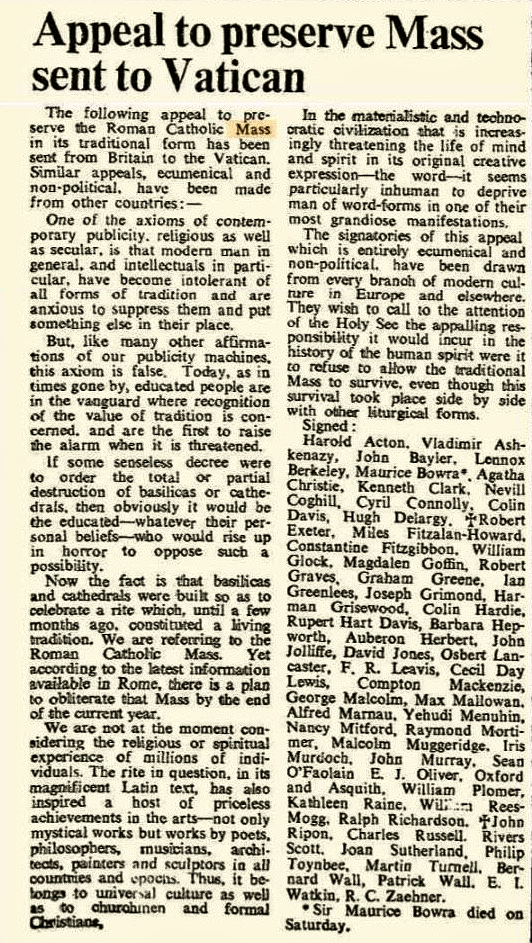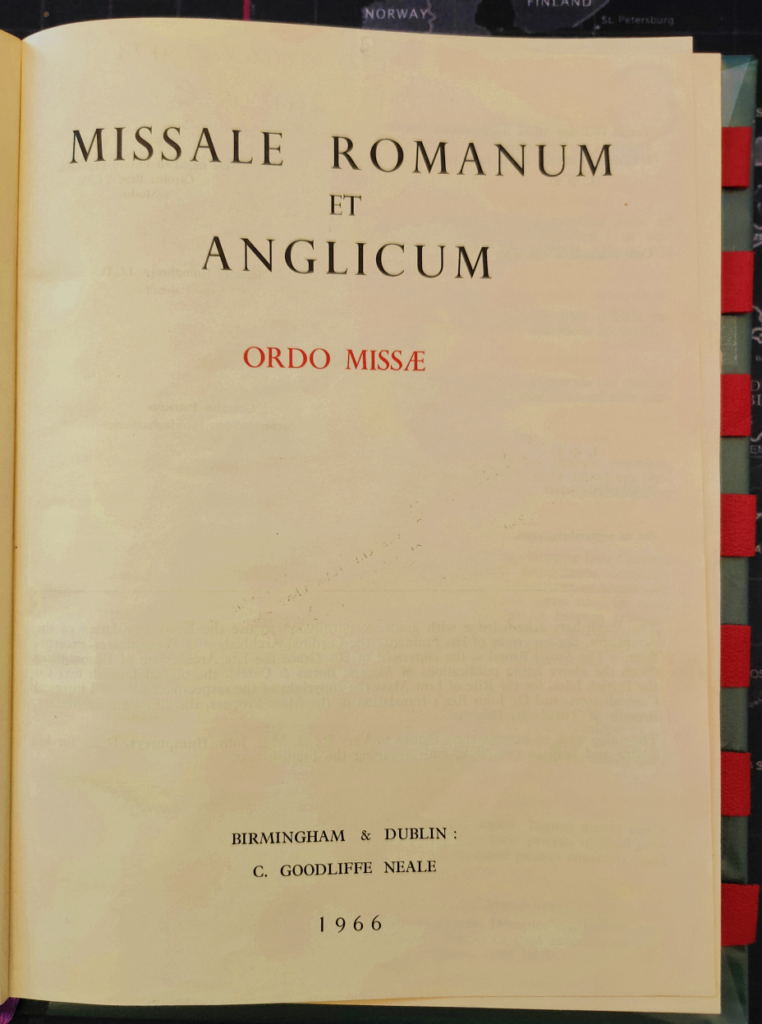IN NOVEMBER 1971 I was only three years of age, and liturgical matters were somewhat supra dig for me. In fact, by then my mother may have already stopped going to Mass, so confused and upset—and unprepared—was she about the changes to the Mass. Not that I was absolved from Mass attendance in my later boyhood; my Presbyterian father would take me. (That eventually had its effect, and he swam the Tiber less than a year before his death.) Moreover, I was sent to a mainstream Jesuit school, which was, it must be said, sensible liturgically in my days there. My mother‘s issues with the Church‘s liturgical reform were personal, and she did not seek to inflict them on me. She was no fool, but she did not have the liturgical and ecclesiastical vocabulary to articulate her misgivings. In the face of not being able to make oneself heard I guess a person withdraws.
Of course, the liturgical reforms hit more than my mother personally. History shows that even non-Catholics were alarmed and saddened at the prospect of reform, and even more with the reforms delivered. Despite the eminence of some of the critics of reform, those who sought modest or little reform had lost the day, and in the public square their voice was drowned out. Yet many would argue that their voice was prophetic.
On 5 November 1971 Cardinal Heenan of Westminster received word from the Roman curia—via Fr Bugnini to be precise— that Paul VI had granted permission to the Church in England and Wales to allow exceptions to the mandatory celebration of the new Mass. This was in response to Heenan’s personal overture to the pope, and the petition published earlier in The Times seeking to preserve the Church’s ancient liturgy. Many of the signatories were not Catholic, but claimed for the Mass a cultural and historic significance beyond the confines of the Catholic Church. Signatories included Vladimir Ashkenazy, Maurice Bowra, Agatha Christie, Kenneth Clark, Miles Fitzalan-Howard, Robert Graves, Graham Greene, Rupert Hart-Davis, F.R. Leavis, Cecil Day Lewis, Compton Mackenzie, Yehudi Menuhin, Nancy Mitford, Raymond Mortimer, Malcolm Muggeridge, Iris Murdoch, William Rees-Mogg, Ralph Richardson, Joan Sutherland, and the Anglican bishops of Exeter and Ripon.
Tradition tells us that one name caught the papal eye and favour: Agatha Christie. Thus the indult granted to Cardinal Heenan is affectionately known as the Agatha Christie Indult. It is this same indult that Archbishop Roche, the new Prefect of the Sacred Congregation for Divine Worship, says he cannot find in the curial archives in Rome (section [f] in his letter to be found here).
What was the argument put forth by the signatories? You can see for yourself:

In a sense they achieved some measure of success, however limited, with the granting of the papal indult. However, it is important to be clear what the indult permitted. It did not permit what we learned to call, from 2007, the Extraordinary Form of the Mass. That is to say, it was not the Roman Missal of 1962 that was permitted in these limited circumstances. The indult declared that,
it is permitted to the local Ordinaries of England and Wales to grant that certain groups of the faithful may on special occasions be allowed to participate in the Mass celebrated according to the Rites and texts of the former Roman Missal. The edition of the Missal to be used on these occasions should be that published again by the Decree of the Sacred Congregation of Rites (27 January 1965), and with the modifications indicated in the Instructio altera (4 May 1967).
In other words, it permits celebration of the Ordo Missae of 1965, with subsequent alterations made by the decree Tres abhinc annos in 1967. This was not a “typical” edition of the Missal, as the editions of 1962 and 1970 were. Rather it was the edition of 1962 modified according to the changes of 1965 and 1967. (cf Nuper edita Instructione, 27 January 1965)
It was this Mass that Archbishop Lefebvre used for many years, before his rupture with Rome was irreparably entrenched. It was this Mass to which the signatories of the petition referred to as facing obliteration “by the end of the current year” (ie 1971). It was this Mass traditionalists preserved until 1988.
This clarification is important in light of the recent motu proprio Traditionis custodes (TC), which significantly restricts the celebration of the Roman Missal of 1962, which had been liberated by Benedict XVI in 2007.
It is important because the petitioners, and Archbishop Lefebvre, clearly accepted that the revisions to the Mass after the Council but before 1969—which is to say, the Ordo Missae 1965/67—adequately (if not perfectly) embodied the traditional liturgy of the Mass which they sought to preserve.
It is important even more because TC makes the claim that
The liturgical books promulgated by Saint Paul VI and Saint John Paul II, in conformity with the decrees of Vatican Council II, are the unique expression of the lex orandi of the Roman Rite.
Traditionis custodes, §1
Moreover, in Francis’ letter to the bishops which accompanied TC, the pope moves again to
declare that the liturgical books promulgated by the saintly Pontiffs Paul VI and John Paul II, in conformity with the decrees of Vatican Council II, constitute the unique expression of the lex orandi of the Roman Rite.
Letter to the Bishops accompanying Traditionis custodes, para 10.
Now, many would, and do, dispute this claim on liturgiological grounds. But given that this decree is in force for the time being, and abrogates all concessions made prior to it, the wording of the papal declaration is important.
Why? Because the Ordo Missae 1965/67 was promulgated by “Paul VI” and “in conformity with the decrees of Vatican Council II.” Thus it conforms, prima facie, to the papal declaration in TC. Just as interesting is that Francis, most notably in the Accompanying Letter, abrogates previous indults and concessions such as the Heenan/Agatha Christie indult. However, a plain reading of TC and its accompanying letter suggests that the Heenan indult is no longer necessary anyway, since Francis himself has implicitly liberated the celebration of the Ordo Missae 1965/67, given that it satisfies the papal definition of what constitutes the lex orandi of the Roman Rite today.
In other words, the Heenan/Agatha Christie indult has been itself superseded by an implicit permission to celebrate the liturgy it allowed, and without any of the indult’s restrictions.
Perhaps it is time to dust off and use those interim altar missals from 1965 to 1969. Perhaps it is time to republish them. Just a thought…

Although this is an interesting argument, wouldn’t it fall down on the grounds that the missal promulgated by Paul VI in 1969 superseded the edition of 1962 as modified in 1965 and 1967? So when Pope Francis refers to the liturgical books promulgated by Paul VI, he is necessarily referring to the final edition of the missal that this pope promulgated, i.e. the typical edition of 1969. Similarly, any priest wanting to celebrate Mass in Latin using the Ordinary form of the Roman Missal would now use the edition published in 2002. Pope Francis is not exactly a master of clear language, so most of what he says is ambiguous. But this is at least a possible interpretation of what Pope Francis meant in TC. It is puzzling why he chose the term ‘liturgical books’ in this context since using the term ‘missal’ would have cleared this up.
I know that when the monastery of Fontgombault and its daughter houses decided in the 1980s to celebrate Mass according to the Order of 1965, they required special permission from Rome (which they obtained and continue to enjoy to this day).
Salve David! It is precisely this use of “liturgical books” as opposed to “missal” that opens up the ambiguity and the resulting possibility. My application of the principle “where there is doubt liberty” will only fall when the ambiguity is definitively resolved. Until then…🧐
In this particular case, the ambiguity can only be a good thing. Personally, I now find the so-called Extraordinary form of the Roman missal to be a more prayerful experience and am lucky enough to be able to attend on a regular basis. It never even occurred to me that this could be a sign that I reject the Second Vatican Council. Fortunately, however, that fount of all dogmatic opinion known as The Bitter Pill was on hand to point this out to me. I therefore gave the matter some thought, decided that I had never heard anything so daft in my life, and then carried on attending Mass in the Extraordinary form.